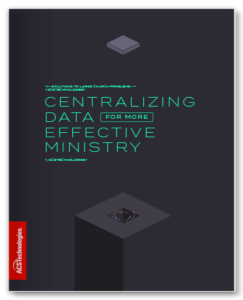The rapid pace of ministry means it’s easy to overlook something like data. On the surface, it’s not as exciting as hosting events or outreach opportunities; it is, however, a critical pillar to success as we are emerging from the pandemic. We’ve all experienced some sort of the psychological term “spaghetti thinking” in one way or another, especially as we are emerging from the pandemic and not only getting our stride back but also finding some new and better ways to conduct ministry.
Imagine walking into your kitchen at dinner time ready to make spaghetti. You open the pantry and can’t find the ingredients. You search high and low. No pasta. A family-wide search shows the noodles are in the guest room closet. The sauce? It’s in the cabinet under the sink in the kid’s bathroom. And the ground beef? Someone yells from the kitchen that it’s in the produce drawer of the fridge next to the apples. How does any of this make sense? It’s a super frustrating and highly unorganized way to prepare dinner. This (likely) isn’t a scenario from your life. But it might be a version of how your church manages data.
Church data expert, Centralizing Data for More Effective Ministry, emphasizes that getting it wrong is easy to do. More commonly than not, things get off the rails in these three areas:
#1 Throw Everything in One Place
Remember the last time someone stopped by with little warning? You probably threw clutter in a closet to hide it. Too many churches do the same thing with their data. Instead of organizing the information, it’s lumped together in a mess.
#2 Assign Everyone to Own It
When everyone is responsible, no one is. Without an owner, no one has the authority and responsibility to ensure it’s done right. Most likely someone already on your staff is the right fit to manage this. The fastest way to set them up for failure, though, is not give them the resources they need.
#3 Leave Fixing It to a ‘One Day’ List
We all have a “one day” list at home and work. It’s the group of things we hope to get done but never actually finish. Leaving data on this list becomes a hindrance to ministry progress and growth. Data should be an “everyday” task, not a “one day” task. Otherwise it never gets done.
If you haven’t read the first blog in this series, Centralizing Data for More Effective Ministry: Path to Efficiency, then I’d like to share this nugget with you, “If you think of data as a tool to be able to connect with people, it changes the perspective a bit.” Don’t permit data to be the bad guy or the dreaded task. Look at it as a way to connect the dots. Remember when you were a child going on a road trip or in primary school and you’d have a book full of connect the dot activities? Data are much like that- connect each number or letter to the next.
In the first stages, it appears to be a bunch of jagged lines that criss-cross and intersect in a shape that is not easily understood. But then, you are diligent to the task, continue to connect the dots in order, and voila: not only does a shape appear, but also a complete image jumps off the page and you realize you’re successful! Organized data works a lot like this, it’s a cornerstone to make your life more simple and efficient for ministry.
Problem: Think about it: how many tools does your team use on a regular basis just to manage day-to-day work? More than you may admit out loud. This scattered approach to data makes ministry harder and less effective.
Solution: Centralizing everything and organizing it well makes your team incredibly efficient. They stay current on relationships. They get insights into trends faster. They know where to find what they need quickly.
We’ve all heard the saying that it’s better to be part of the solution versus being the problem. While I agree with that, we do have to assess a problem to offer a solid solution. Look at your data from an outsider’s perspective. Why choose to be scattered with your data when you can be organized and make the right connections?
Romans 12:5 says this about the importance of connection, “So we, who are many, are one body in Christ, and individually members one of another.” Be diligent in regards to the importance of church data security (SEO) to input and organize the data in order to connect with and grow the body of Christ.

Data should be a massive ministry asset, and it starts by centralizing everything into a single, current, easy-to-use system. This latest resource, Centralizing Data for More Effective Ministry, along with the other guides in the Roadmaps Series: Solutions to Large Church Problems, show streamlined paths you and your team can follow. And, to make it even easier and so you don’t miss any of our Church Growth Resources, you can also receive our ministry blog posts straight to your inbox!
Steve serves as ACS Technologies’ Vice President of Data. He has been with the company since 1982 and started in the programming department. Steve has a degree in management science from the University of South Carolina and a master’s degree in Human Factors in Information Design from Bentley University.




